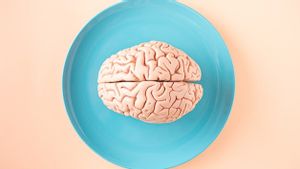
YOGYAKARTA Fading memories are often experienced with age. But for someone with dementia, they will lose their chronic and progressive mental function. Dementia, there are two categories, namely Alzheimer's and non-Alzheimer's. Dementia is also not a disease, but is caused by Alzheimer's disease and is a group of symptoms.
Dementia due to Alzheimer's disease involves memory loss plus brain function disorders including language, speech, and perception. Non-Alzheimer dementia, reported Health, Sunday, June 25, relates to the degeneracy of the fronttemporal lobe with two main types. The first types mostly affect speech and other types involving behavior change, personality change, lack of emotion, loss of social filters, apathy, and problems with planning and organization.
In this non-Alzheimer dementia, memory loss arises later in the development of disease. The second most common cause is vascular dementia. Some other non-Alzheimer dementia is body dementia, Lewy dementia, Parkinson's, and Pick disease. There is also mixed dementia when a person experiences many causes. For example, someone with Alzheimer's disease who also suffers from vascular dementia so that he experiences mixed dementia.
Can dementia be prevented, according to experts, some types of dementia are caused by things that are out of a person's control. But there are things that can be done to reduce the risk of developing dementia by maintaining overall health in the following way.
Research conducted in 2019 shows that aerobic exercises slow down hippocampus atrophy, the part of the brain that controls memory. In this study, active elderly people tend to maintain their cognitive abilities better than those who are less active.
Regular exercise is also good for weight control, circulation, heart health, and mood, all of which can affect the risk of your dementia. If you have serious health conditions, talk to your doctor before starting a new type of exercise. If you haven't exercised for a long time, start small exercise, maybe just 15 minutes a day. In addition, choose easy training and develop from there.
A good diet for the heart both for the brain and overall health. A healthy diet can reduce the risk of conditions that can lead to dementia. According to the World Health Organization (WHO), a balanced diet consists of fruit and vegetables, lentils and beans, tubers or roots, eggs, milk, fish, meat without fat.
In addition to eating healthy foods, avoid saturated fats, animal fats, sugar, and salt. Your diet must be centered on whole foods rich in nutrients. Avoid high-calorie processed foods that provide little or no nutritional value.
Research shows that smoking can increase the risk of dementia, especially if you are over 65 years old. This is because smoking affects blood circulation throughout the body including blood vessels in the brain. If you smoke and find it difficult to stop, talk to your doctor and start a smoking stop program.
In addition to not smoking, research shows excessive alcohol consumption is at higher risk of early dementia. According to the Dietary Guidelines for Americans, it currently defines drinking up to one glass per day for women and up to two glasses for men.
Active thoughts can help reduce the risk of dementia, so keep challenging yourself. Some examples are by learning something new. Like new languages, working on puzzles, playing games, reading books that challenge learning, practicing musical instruments, starting to write, and staying socially involved.
SEE ALSO:
Keeping in good condition can help reduce the risk of dementia. If you have hearing loss, sleep problems, and depression, it is advisable to immediately meet a doctor. It is also important to manage health if diabetes, heart disease, high blood pressure, high cholesterol.
That's how to prevent dementia from an early age. It's important to know, the risk of dementia development increases with age. A total of 5-8 percent of people over 60 years of age, according to WHO, have a form of dementia. The risk of dementia can increase if it experiences conditions such as atherosclerosis, depression, diabetes, Down Syndrome, hearing impairment, HIV, panyakitUL, hydrocephalus, Parkinson's disease, mini-strokes, and blood vessel disorders.
The English, Chinese, Japanese, Arabic, and French versions are automatically generated by the AI. So there may still be inaccuracies in translating, please always see Indonesian as our main language. (system supported by DigitalSiber.id)

















